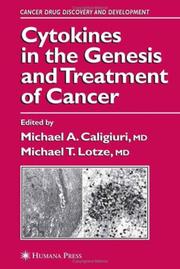| Listing 1 - 2 of 2 |
Sort by
|
Book
Year: 2020 Publisher: Frontiers Media SA
Abstract | Keywords | Export | Availability | Bookmark
 Loading...
Loading...Choose an application
- Reference Manager
- EndNote
- RefWorks (Direct export to RefWorks)
n the last years, our knowledge of human NK cell biology has increased significantly. Several stimulating studies have provided the basis for understanding how NK cells can be “educated” to acquire immunological competence following maturation, or to adapt their function to the environmental changes of “self”. New information has been acquired on their lifespan and on the persistence of memory-like NK cell subsets in response to certain viral infections. In addition, the identification and characterization of new markers and the development of more effective analytic approaches have led to the definition of various phenotypically and/or functionally-defined cell subsets. These advances have, in turn, enabled us to study NK cells beyond the peripheral blood, in different tissue compartments including the bone marrow, liver, lungs, skin, intestine and uterus. Recent data indicates that at least part of the tissue NK cell compartment consists of resident cells (which rarely recirculate) characterized by tissue-specific phenotypes and, in some cases, endowed with specialized functions related to the distinct organs in which they reside. These findings stimulate further questions (i) on the origins of these putative tissue-specific NK cell subsets; (ii) on their functional interplay with the local microenvironment; (iii) on their immunological competence and memory capacity and (iv) on their possible specific functional role in healthy and diseased tissues. In this context, the assessment of phenotype, function, maturation, education, differentiation and reprogramming of effector functions in tissue NK cells represents a new stimulating field of investigation that would help to get a more comprehensive picture of NK cell biology. In this Research Topic, we collect articles that highlight the recent advances in our understanding of tissue NK cells and that provide insight into opening new viewpoints on the role of NK cells in both health and disease.
Medicine --- Immunology --- conventional NK cells --- tissue resident NK cells --- innate lymphoid cells --- tissue microenvironment --- NK receptors

ISBN: 128097172X 9786610971725 1597454559 0896038203 Year: 2007 Publisher: Totowa, N.J. : Paisley : Humana ; Quantum [distributor],
Abstract | Keywords | Export | Availability | Bookmark
 Loading...
Loading...Choose an application
- Reference Manager
- EndNote
- RefWorks (Direct export to RefWorks)
Cytokines in the Genesis and Treatment of Cancer provides a comprehensive picture of the dual role of host responses in promoting and inhibiting tumor progression. This volume represents an important investigation into the emerging intersection of cancer biology and cancer immunology. Divided into four sections, the volume’s first three parts focus on cytokines in the genesis of cancer. The final section describes the notable progress — both in animal models and humans — in demonstrating the use of cytokine or anticytokine therapies for the prevention and treatment of cancer. Cytokines in the Genesis and Treatment of Cancer brings together an impressive array of internationally distinguished investigators who are devoted to the study of cytokines and cancer. Together, they produce an insightful, comprehensive discussion of cytokines and cancer that will serve as the perfect reference for all those working in the field.
Cancer --- Cytokines --- Chemotherapy. --- Therapeutic use. --- Antineoplastic agents --- Treatment
| Listing 1 - 2 of 2 |
Sort by
|

 Search
Search Feedback
Feedback About UniCat
About UniCat  Help
Help News
News